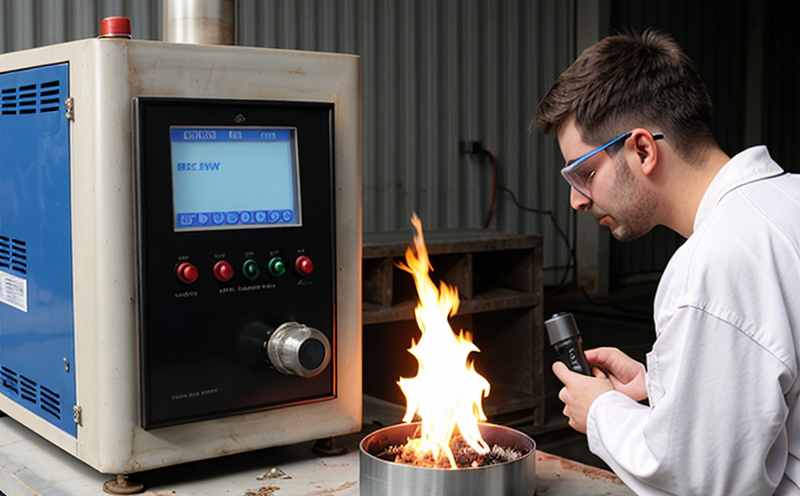DIN EN 1264 Radiant Floor Heating Output Test
Thermal and heat transfer testing is crucial in ensuring that HVAC (Heating, Ventilation, and Air Conditioning) systems meet stringent performance standards. Among the various tests conducted, the DIN EN 1264 Radiant Floor Heating Output Test plays a pivotal role in assessing the efficiency of radiant floor heating systems. This test evaluates the output power of the heating elements within the flooring system, ensuring that they deliver the specified heat output as per design.
The DIN EN 1264 standard is widely recognized for its stringent requirements and comprehensive approach to testing radiant floor heating outputs. It involves a series of carefully controlled procedures designed to simulate real-world conditions under which the heating elements will operate. The test aims to assess the actual heat output, ensuring that it matches the nominal values stated in the product specifications.
During the test, specimens are prepared by installing the radiant floor heating system on a specified substrate. The setup is then calibrated to ensure accurate measurement of the heat output. Once calibrated, sensors are placed at strategic locations within the flooring to monitor temperature changes accurately. The test typically involves subjecting the system to a defined set of operational parameters, including power settings and duration times.
The results of this testing are critical for quality assurance in HVAC equipment manufacturing. It helps manufacturers identify any discrepancies between the expected performance and actual output, allowing them to make necessary adjustments before product release. Compliance with DIN EN 1264 ensures that the final products meet industry standards, enhancing consumer satisfaction and trust.
Accurate testing is essential for maintaining high-quality HVAC systems. By adhering to international standards like DIN EN 1264, manufacturers can ensure their products are reliable and efficient in delivering heat. This not only enhances customer confidence but also contributes to energy efficiency, which is increasingly important in today’s environmentally conscious world.
The DIN EN 1264 standard is applicable across various sectors including residential buildings, commercial properties, and industrial facilities. In each of these environments, radiant floor heating systems play a crucial role in providing comfortable indoor temperatures while contributing to overall energy management strategies.
- Preparation: Specimens are installed on a concrete or wooden substrate depending on the test requirements.
- Instrumentation: Temperature sensors and data loggers capture real-time temperature changes during testing.
- Calibration: All instruments used in the test must be calibrated to ensure accurate measurement of heat output.
- Data Analysis: Collected data is analyzed using statistical methods to determine compliance with specified performance criteria.
In conclusion, the DIN EN 1264 Radiant Floor Heating Output Test is an essential step in ensuring that HVAC equipment meets stringent quality standards. By adhering to this rigorous testing protocol, manufacturers can produce reliable and efficient heating systems that contribute significantly to energy conservation efforts and occupant comfort.
Benefits
The DIN EN 1264 Radiant Floor Heating Output Test offers numerous advantages for those involved in HVAC equipment manufacturing and quality assurance. One of the primary benefits is improved product reliability, which leads to enhanced customer satisfaction. By ensuring that the heating elements deliver consistent heat output as designed, manufacturers can reduce warranty claims and improve brand reputation.
Another significant benefit is compliance with international standards. Adherence to DIN EN 1264 not only ensures regulatory compliance but also positions a company as an industry leader in quality assurance practices. This can be particularly advantageous when competing in global markets where stringent testing requirements are the norm.
The test also facilitates continuous improvement within manufacturing processes. By identifying any deviations from expected performance, manufacturers can pinpoint areas for optimization and innovation. This ongoing refinement process ultimately results in more efficient and effective HVAC systems.
Moreover, the DIN EN 1264 Radiant Floor Heating Output Test contributes to sustainable development goals by promoting energy-efficient solutions. In an era where environmental concerns are paramount, compliant products play a crucial role in reducing carbon footprints associated with heating applications.
Lastly, this testing ensures consistent performance across batches of manufactured goods. This consistency is vital for maintaining high standards throughout the production line, thereby enhancing overall productivity and competitiveness within the market space.
Eurolab Advantages
Eurolab prides itself on offering comprehensive services that cater specifically to the needs of our clients in the HVAC industry. Our expertise lies not only in performing rigorous tests like the DIN EN 1264 Radiant Floor Heating Output Test but also providing valuable insights into how these tests impact product quality and performance.
One key advantage of Eurolab is our state-of-the-art facilities equipped with advanced instrumentation capable of delivering precise results. These tools allow us to conduct thorough evaluations under controlled conditions, ensuring accurate assessments of heat output parameters.
Our team comprises highly skilled professionals who possess extensive knowledge in thermal and mechanical testing methodologies. They are well-versed in interpreting complex data sets generated during testing procedures, enabling them to provide actionable recommendations based on findings from these tests.
Additionally, Eurolab offers flexible scheduling options tailored to meet client timelines without compromising on quality standards. This flexibility ensures that our services remain accessible even when faced with tight deadlines or unexpected challenges.
We understand the importance of confidentiality and integrity in testing processes. Therefore, all information exchanged during project execution remains strictly confidential between parties involved. This commitment fosters trust between us and our clients, allowing for open communication throughout each stage of collaboration.
Lastly, Eurolab maintains strict adherence to relevant international standards such as DIN EN 1264 when conducting tests related to radiant floor heating outputs. By doing so, we ensure that all results are accurate reflections of actual performance capabilities while meeting the highest level of precision expected by industry stakeholders.





